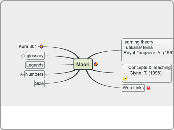Maori
learning theory
Tuakana/Teina
Royal-Tangaere, A. (1997).
Royal Tangarere (1997)
Te puawaitanga o te reo Maori
pp 10-18
Wellington:
NZCER
recorded in legends
Tane ascended the 12 realms
returned with 3 baskets of knowledge
All dimensions within individual
must be considered as a whole
Physical
Tinana
cognition
Hinengaro
emotions
Whatumanawa
spiritual
Wairua
cognitive development
is a process of
practising
repeating
sorting
analysing
experimenting
reviewing
Whanau is an important assistance
starts tuakana/teina
instituting a system of practical experience
like an apprenticeship
scaffolding lang acquisition
Visualised as a series of steps like a poutama pattern
Supports Theories of Vygotsky
ZPD
learning as interaction between people and learner
meaning determined by situation and context
internalisation
process of understanding
socialisation
use of language in the context of culture
e.g. mihimihi
Bruner (1983)
early dialogue mostly "thing" oriented
next action words (verbs)
LASS
language acquisition support system
Peter & Boggs (1986)
lang. acquisition due to need to socialise
Bronfenbrenner (1986)
Ecology of Human Development
Environment and family processes
Kura 301
glossary
A
Ako
teaching
aroha
Love
H
haka
dance
Hinengaro
cognition
K
karakia
incantations / prayer
I
iwi
tribe
M
Mihimihi
Who your whanau is
P
poutama
weaving design
Pepeha
Where you are from
T
Taonga
Gift
teina
younger sibling
Tinana
Physical
tuakana
older sibling
tukutuku
lattice weaving
W
waiata
songs
Wairua
spiritual
Whakapapa
Ancestry
Whanau
Family
Whatumanawa
emotions
whanaungatanga
learning
Legends
Numbers
kore
tahi
rua
Toru
Wha
rima
ono
whitu
waru
iwa
tekau
tekau ma tahi
tekau ma rua
tekau ma rua
:
:
rua tekau
toru tekau
wha tekau
rau
Size
Concepts & Teaching
Glynn, T. (1998).
Glynn, T. (1998).
Bicultural challenges for educational professionals in Aotearoa.
Waikato Journal of Education,
4, 3-16.
maori history characterised by control of the majority
economic
social
political
refugees and migrants entitled to have their culture recognised
kaupapa maori
challenge at grass roots level to resist
Concerns
awknowledge Tino rangatiratanga
treating everyone the same does not address Maori aspirations for education
as a minority Maori have little power to effect cultural change
How
